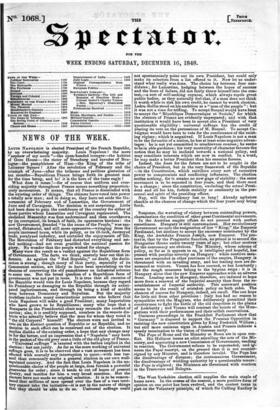Suspense, the wavering of victory between contending powers, characterizes the
condition of other great Continental movements.
In the Austrian empire affairs do not proceed with perfect smoothness. Hungary is still contumacious. Her revolutionary Government accepts the resignation of her "King," the Emperor Ferdinand, but declines to accept the successor nominated by the King, the Archduke Francis Joseph, now Emperor. The pre- text is, that by the Pragmatic Sanction, no prince is to ascend the Hungarian throne under twenty years of age; but other motives for the contumacy are obvious. The Ministry, whose scheme of policy, so far as it appears to us, is intelligent and hopeful, has pressed with peculiar severity on Hungary : while coercive mea- sures are suspended in other provinces cf the empire, Hungary is threatened with an invading army, and her leading men are de- nounced as traitors. Vienna has been coerced, so has Lombardy ; but the rough measures belong to the bygone reign : it is in Hungary alone that the new Emperor approaches with an adverse front. Leading men in Hungary, therefore, are induced to hope more from a renewal of the Imperial anarchy than from the re- establishment of Imperial authority. This untoward position seems to be the result of mistaken policy on both sides. The chances of success for Hungary, indeed, are small. She can hope for little aid from other provinces : Italy has had no reason to sympathize with the Magyars, who deliberately permitted their countrymen to fight the battle of the old despotism in the plains of Lombardy ; and Vienna will contrast the boasts of the Hun- garians with their performances and their selfish reservations.
Ominous proceedings in the Frankfort Parliament show that " Germany " is disposed to support the Prussian Opposition in resisting the new constitution given by King Frederick William ; but still more ominous signs in Austria and Prussia indicate a speedy termination to the vision of German unity.
The Pope of Rome and the Ministry at Rome are in open con- flict. His Holiness issues an edict annulling the acts of the Mi- nistry, and appointing a new Commission of Government, tending to reaction. The Government refuses to be superseded, and ig- nores the Papal rescript, on the ground that it is not counter- signed by any Minister, and is therefore invalid. The Pope has the disadvantage of distance; the contumacious Government, the disadvantage of wielding authority by a questionable tenure : the Pope is slighted; the Ministers are threatened with reaction in the Trastevere and Bologna.


























